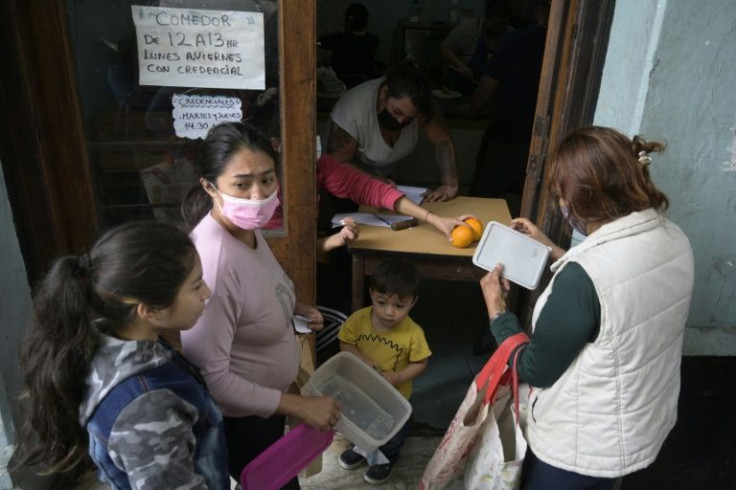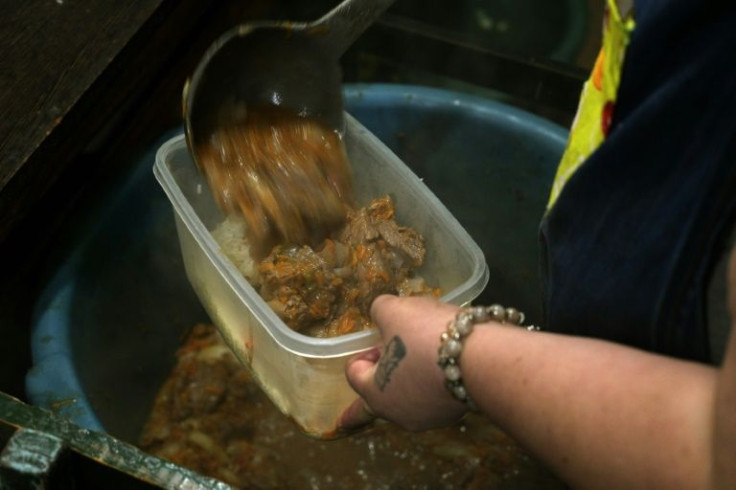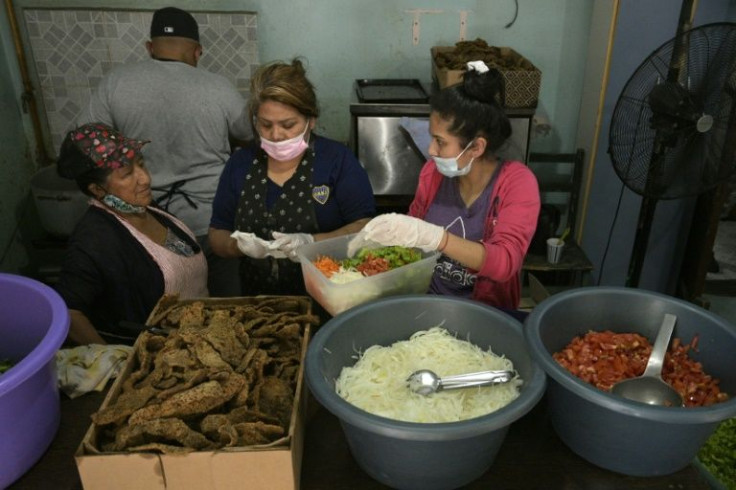Covid-related Lack Of Work Leaves Argentine Stomachs Empty
Fatima Gomez, Stefani Chinguely and Carlos Alberto Alvareza head every day to a soup kitchen in their working class Buenos Aires neighborhood.
When the government shut down much of the economy to stop the spread of Covid-19, they had to give up work and now find themselves impotent in the face of rampant inflation that devours their meagre savings.
"I've been coming to the soup kitchen for around five months. I always had work and earned good money," said Chinguel, 23.
"But not any more. Every day I send out my CV but no-one calls me."
She leaves with two meals in a box: one for her and one for her partner who works in a shop but whose salary is not enough to support them.

"Sometimes they increase my boyfriend's salary, but 1,000 pesos ($9) is not enough to match rising prices," said Chinguel.
Inflation this year is 41.8 percent, one of the highest in the world -- a key factor at play in Argentina's parliamentary elections on Sunday.
Since turning 18, Chinguel has worked as a carer for the elderly and as a car saleswoman, amongst other jobs.
She heads to the soup kitchen in La Boca also in the hope of finding work.
Those working in the kitchen are given a state subsidy worth half the minimum monthly wage of 32,000 pesos ($300).
"Many people want to work here but there are no vacancies," said Edith Cusipaucar, 40, a mother of six.

She also receives 15,400 pesos a month in family allowance for her three youngest children.
But she still has to head out every evening to sell food on the street.
"Do you think you can feed a family with 15,400 pesos a month?" she said.
Soup kitchens run by social action groups with state funds have sprung up on practically every street corner in poor neighborhoods like La Boca.

Gomez works for a cleaning company and while she never lost her job during the pandemic lockdown, her employers simply do not have any offices to clean.
Her salary was practically reduced by half, and for the first time in her life she needed a soup kitchen to feed her three children and granddaughter.
"I work to survive. If I don't take away food, we can't manage at the end of the month. It's not enough. Maybe we eat lunch but not dinner," said Gomez, who has lived in a boarding house for 20 years.
Alvarez, a 61-year-old peddler, says he cannot sell his wares any more.
"In the street the police chase us. They don't let us work," he complained.
"I come here out of necessity, out of hunger. There's no work, that's why we come looking for work."
Unemployment in Argentina was 9.6 percent in the second quarter of 2021, with underemployment reaching 12.4 percent and poverty 40.6 percent.
"The pandemic accelerated processes that were already happening in the world where there is ever more informal or unrecognized work," said Ezequiel Barbenza, a professor at Salvador University.
"When, from one day to the next, they slow down the circulation of people and, as a consequence the economy, a system that was prepared to include all people is left exposed."
During the 2020 lockdown, the state offered assistance to informal workers.
"It was designed for three million people, 12 million applied and nine million were accepted. It showed a huge universe," said Barbenza.
The lack of work, alongside inflation and personal security, are the issues that most worry Argentines, according to political scientist Diego Reynoso.
"It creates a lot of uncertainty for people and great discomfort. There is a society that is very worried, annoyed, unhappy, with fatal humor, which they aim at the government."
Just how much they blame the government will be apparent in Sunday's parliamentary elections, where the governing Everyone's Front party risks losing its senate majority.
© Copyright AFP 2024. All rights reserved.





















